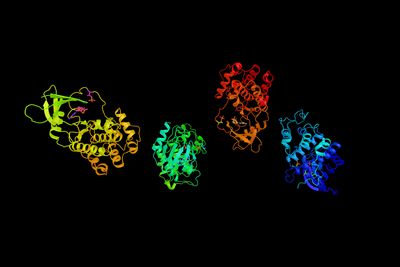Malfunctioning of the enzyme CDK7 is crucial to many cancers, making drugs that target it a high priority. Despite some demonstrated success, the mechanism by which these drugs work has been a mystery for decades, impeding progress in developing better ones. An answer to that puzzle could open the path to variations that could save a lot of lives.
The defining feature of cancers is cells that multiply when they shouldn’t, creating uncontrolled growth. There are many causes of that unlimited proliferation, which is why there will never be a single cure for all cancers. However, cyclin-dependent kinase 7 (CDK7) – considered a master regulator because it activates four other CDKs, which in turn trigger cell division – is implicated in a wide range.
When something goes wrong with CDK7, the result can be cancers in many tissues, including “triple negative” breast cancers, which have remained hard to treat while there have been major advances against other cancers of the breast. That has made CDK7 a long-standing target for medical researchers, and several companies have sponsored clinical trials for competing CDK7 inhibitors.
These trials showed the drugs did slow tumor growth, proving researchers are on the right track, but the side effects are serious, and the tumors survive. Normally, when scientists get results like this they tweak the drugs to find versions that control their target more effectively with fewer side-effects. That’s been hampered, however, by not knowing how these drugs affect CDK7.
This is where a new study on one CDK7 inhibitor, SY-5609, may offer a breakthrough, indicating the CDK7 is not doing its damage in what was considered the most likely way.
Professor Dylan Taatjes of the University of Colorado, Boulder, and colleagues applied SY-5609 to 79 cancerous cell lines in the lab, and used advanced observational techniques to see what happened both under normal conditions and when the cells were heat-shocked.
Within 30 minutes, transcription factors that trigger genes for cell proliferation shut down, while remaining on in control cells. The cell lines represented 27 tissue types, proving the effect is common in what we think of as many different cancers.
“We found that the second that you inhibit CDK7, all of these core transcription factors shut off at once, stopping proliferation in its tracks,” Taatjes said in a statement.
SY-5609 binds strongly to CDK7, and appears to use a combined mechanism to control tumor proliferation. It both inhibits CDK7 and activates a gene responsible for producing retinoblastoma protein 1 (RB1). RB1 douses a variety of transcription factors that can trigger uncontrolled proliferation. Cancers have the capacity to interfere with RB1’s normal effectiveness, and efforts to boost it without controlling CDK7 have shown little success.
“This study reveals that CDK7 controls RB1 function – a finding that could open doors to new ways of therapeutically targeting RB1,” said Taatjes.
The more obvious mechanism for CDK7 to work was through its influence on other CDKs. However, the team were able to show the effects on CDK4 and 6 aren’t the reason inhibition of CDK7 slows tumor growth, preventing a lot of wasted effort investigating a fruitless path.
The problem with drugs that suppress genes, or their proteins, is that these proteins almost always have an important role in our body, otherwise evolution would have eliminated them. Stopping the genes when they misfire can also prevent them from doing what they are supposed to.
The team observed that this also happens with SY-5609, which had been provided by developers Syros Pharmaceuticals. However, the effects on CDK7’s initiation of healthy cell division are slower than the shutting down of transcription factors and operate in a different way. That has given the authors hope it is possible to get the best of both worlds.
“Instead of, essentially, using a sledgehammer to shut down all CDK7 activities, it could be that you could shut down just one branch of its activities that is more important for tumor proliferation while minimally disrupting normal cell function,” said Taatjes.
Maybe we can get a ninja drug that gets in fast enough to allow RB1 to perform its tumor-suppression role but is out in time to allow normal function to resume.
The work is open access in Science Advances.





